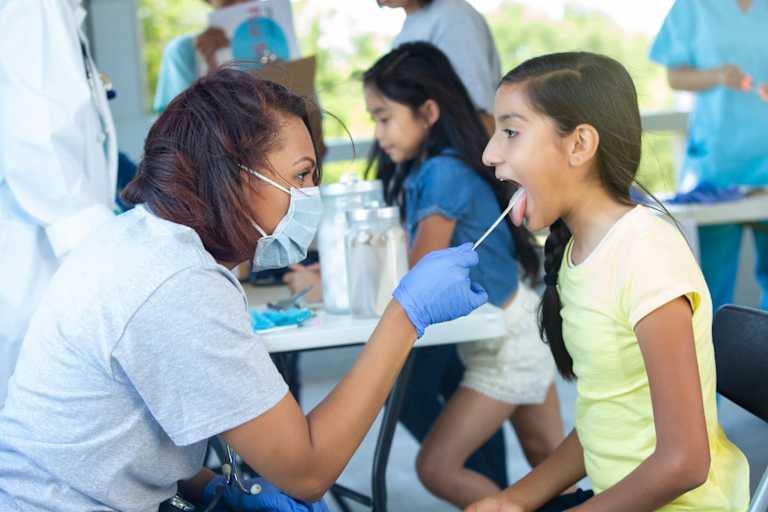Ask a Nurse: Why Become a Community Health Nurse?
 Credit: SDI Productions / E+ / Getty Images
Credit: SDI Productions / E+ / Getty ImagesIn our Ask a Nurse series, experienced nurses provide an insider look at the nursing profession by answering your questions about nursing careers, degrees, and resources.
Question: I am considering becoming a community health nurse. Is this a good career path for registered nurses (RNs)?
Answer: A nursing career has several significant advantages (or at least I think so!). A major advantage is how easily nurses can switch from one specialty to another with just a little planning. So, if you are thinking about switching to community health nursing, it’s a career choice you’ll definitely want to consider.
Community health nursing offers you the chance to form long-term relationships with your patients. In contrast, a hospital RN may care for patients for just a couple of days. Fostering these relationships can lead to lower emotional exhaustion for community health nurses.
Since community nursing is less structured, you’ll need strong clinical and critical thinking skills in nursing.
You can make long-term changes in a patient’s life by focusing on prevention rather than symptom management in an acute care setting. Community health nurses may find employment in:
The average registered nurse made a median salary of $75,330 as per the U.S. Bureau of Labor Statistics. Although a community health nurse’s average annual salary is slightly less at $63,000 according to PayScale as of August 2021, added benefits include a more flexible schedule and greater independence.
Community health nurses can practice in various nonhospital settings. The hallmarks of community nurses — being adaptable and willing to provide care in churches, clinics, schools, and homeless shelters — mean that many without access to healthcare or insurance coverage can receive care.
What Do Community Nurses Do?
As a community nurse, you can provide care that improves the health outcomes of underserved individuals and the health management of community health diseases.
Increased independence is a key quality of community health nursing. Of course, there are advantages and disadvantages to having more autonomy in your practice. Autonomy within a hospital setting has significant benefits for patient outcomes. In a community setting, nurses can adapt their healthcare delivery to meet the needs of the patient population.
For example, encouraging and directing pregnant individuals and new mothers to receive appropriate medical care helps reduce disparities in infant mortality. Community health nurses also address the needs of their community through preventive care programs. These may be on lead poisoning, sexually transmitted diseases, substance use, and the risks of smoking.
COVID-19’s Impact on Community Nurses
Community health professionals have been essential to the public health response and pandemic preparedness. Since the beginning of the pandemic, there’s been a high demand for community nurses to care for those disproportionately affected by this infectious disease, such as those with underlying conditions and the elderly. Increasing the number of community nurses in vulnerable populations during COVID-19 has reduced the pandemic’s overall impact on communities.
How to Become a Community Health Nurse
The path to becoming a community health nurse starts with a strong background in environmental health and epidemiology. You must have a license to practice in the state where you live and experience. There are optional nursing certifications in community health nursing, but many employers prefer nurses who are certified. Let’s explore the requirements to be a community nurse.
Education Requirements
Although nurses may have their associate degree in nursing (ADN), most employers prefer nurses with a bachelor of science (BSN) over an ADN. Nurses with a master of science in nursing (MSN), doctor of nursing practice, or doctor of philosophy in nursing may find roles in administration and leadership.
Earning a License
After completing your ADN or BSN degree from an accredited program, you must pass the National Council Licensure Examination (NCLEX) for RNs by mastering NCLEX-type test questions. Even if you earned an MSN degree, you must pass this exam to practice nursing in any role in your state.
Required Experience
Many employers are looking for nurses with past experience in a hospital or office setting. The autonomous nature of the position can make it difficult for a new nurse to function successfully. Employers are also looking for experience outside your clinical role. Consider volunteer positions in community health roles to expand your experience.
Certification
Certifications are optional but improve your employment opportunity. Because some BSN programs include public health courses, you may be able to take a certification examination after graduation. Some states require a formal certification; check your state board of licensure. At one time the American Nurses Credentialing Center offered certification for public health nurses, but it is now available for renewal only.
In Summary
Increased responsibilities for patient management and high levels of job satisfaction make community health nursing a unique option in healthcare. Community health nurses:
- Work in the community, focusing on long-term changes through health education and preventive care to populations that may not have access to healthcare or insurance coverage
- Are known for being adaptable, autonomous, and flexible as they can work in schools, government offices, churches, and other community settings
- May address the health needs of individuals, families, or community populations
- Need a strong foundation in public health, epidemiology, and environmental health to be successful
- Must graduate from an accredited nursing program and pass the NCLEX-RN (Some states require certification offered through the state board of nursing, and most employers prefer certified community health nurses.)
Written by:

Gayle Morris practiced in pediatric medicine for over 20 years before hanging up her stethoscope and picking up a pen. She has been a full-time health and wellness freelance writer for over 10 years. Morris is a mom to four children. She is renovating her home on the weekends. When she has free time, you’ll find her reading, playing with her dog, or enjoying long bike rides.



